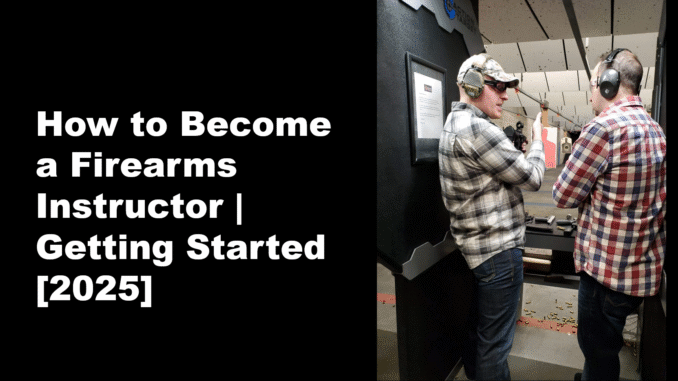
So you’re thinking about becoming a professional firearms instructor? Good for you! There’s always a need for knowledgeable and safe people to help newcomers and veterans alike learn how to improve their skills with a gun in their hand. You’ve probably hit the range a time or two, have maybe taken some classes, and are eager to help those who now occupy the shoes you once wore. Now you may be wondering how you make the jump from student to instructor.
While I’m certainly no Tom Givens or Rob Haught, I’ve taught a fair bit over the past decade or so, and have explored our world with some depth and breadth. Let’s take a look at some of the ways you can become a firearms instructor, and some tips to help you develop your skills.
Certification
The instructor certification process is one of the most popular methods of creating firearms instructors in the United States. Organizations like the NRA and USCCA certify hundreds, if not thousands, of instructors every year in subjects like defensive pistol, target rifle, and other disciplines. Typically you’ll attend an in-person training course, then complete both written tests and practical skills evaluations. If you meet the standards of the course, you’ll receive your certificate and a blessing to instructor under this organization’s banner. I first became certified through the NRA to teach back in early 2016, and my wife received her USCCA instructor credentials in 2022. Since then I’ve cobbled together about a dozen certifications from half a dozen organizations over the years.
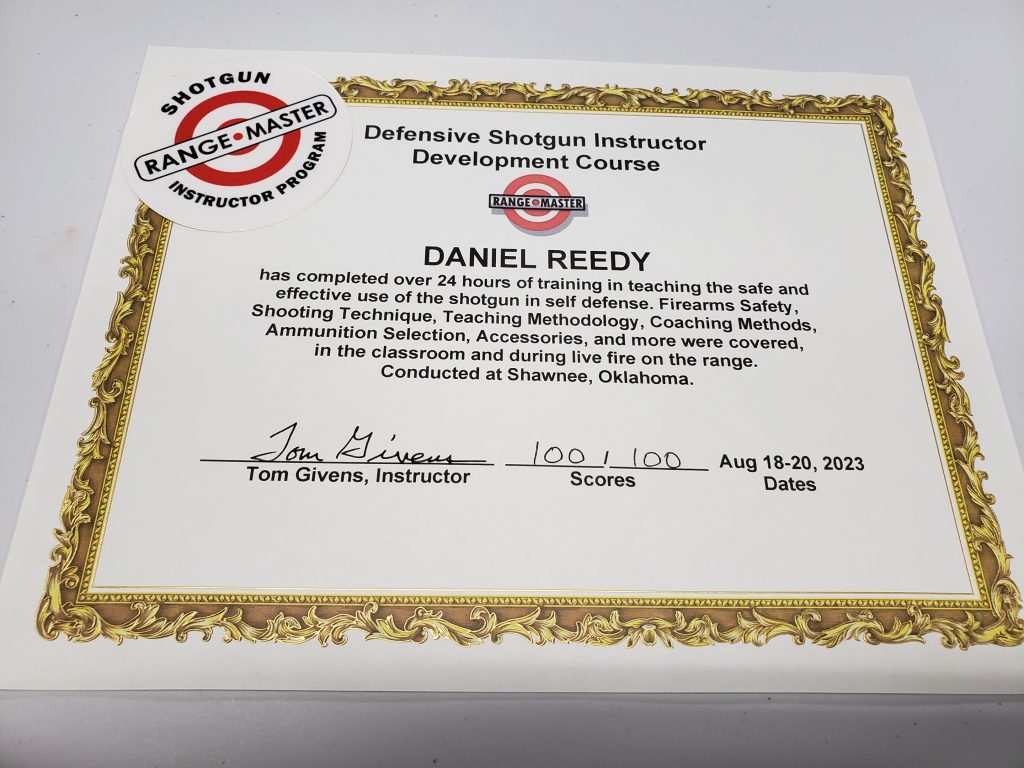
Some courses are tougher than others, with Rangemaster and Modern Samurai Project being some of the leading “alternative” certification courses. These can be general instructor certifications, while others can be specific, such as Red Dot Pistol instructor, Close Quarters Gunfighting, and more. While many of these offerings provide greater knowledge than more general courses, they often aren’t as widely accepted as NRA and USCCA credentials. I recommend getting one of these more basic certifications to cover your bases, then getting continuation training to help develop you further.
Here are a few schools that I recommend:
- Rangemaster
- Active Response Training
- Cougar Mountain Solutions
- Agile Training & Consulting
- Citizen’s Safety Academy
- The NRA
- Modern Samurai Project
- Gunsite Academy
Apprenticeship
Apprenticeship is another excellent way to work your way up to instruction. Find someone to take you under their wing, allowing you to assist them in various roles over the course of several months or years. This is most often accomplished in an institutional setting, but it can be done privately as well. Becoming someone’s apprentice takes work, you have to establish a relationship, build trust, and be brought into that role by a mentor. You aren’t fully in control here, and it may be difficult to find someone to take you on.
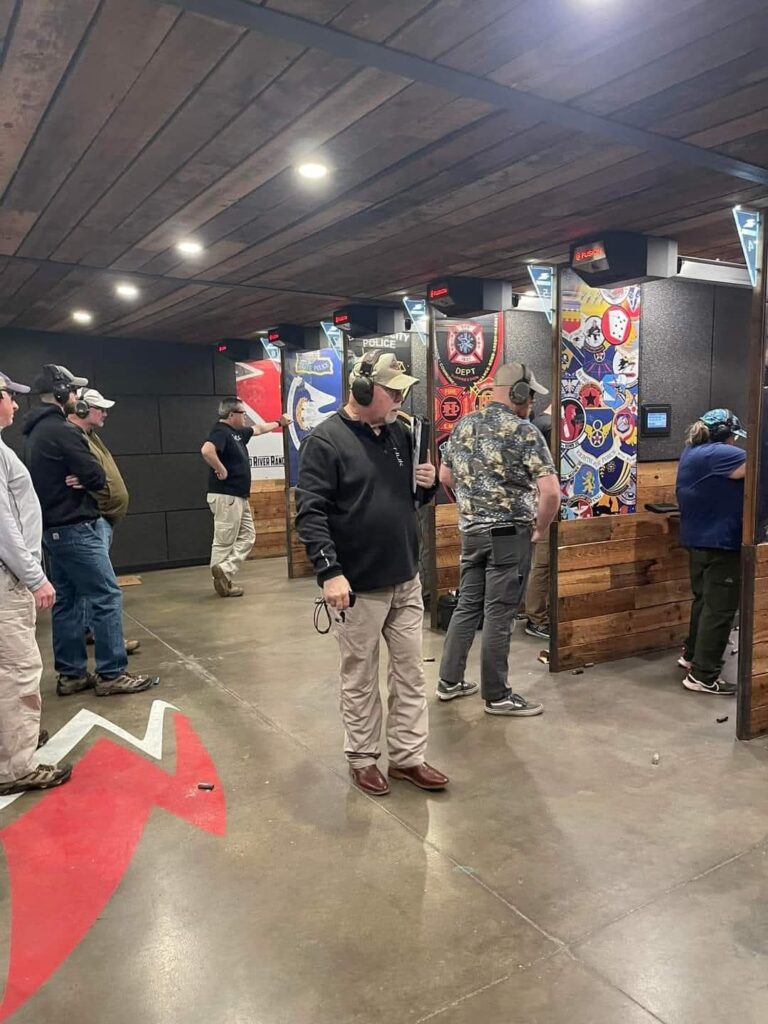
That said, mentor and apprentice roles can look very different from team to team. Just because you’re not on the range with someone for each class doesn’t mean you can’t grow with them. Ask questions, be eager, and be willing to put forth effort, and you’ll stand out. Even offering to hang targets or help reconfigure the range as a student can pay dividends.
Assistant Instructor
Being an Assistant Instructor (AI) is a great way to dip your toes into the instructor role without having the full responsibility of an instructor. You’re likely not writing curriculum, scheduling classes, or handling administrative functions, though these can be roles that you step into over time. In my experiences, I’m helping students refine technique, fixing stoppages and other issues, watching for safety, and generally corralling wayward students. Citizen’s Safety Academy has an excellent certification course for AI’s, which can help you understand some roles and responsibilities of the position.
Assisting another instructor often provides far more valuable experience for running a class than simply taking a certification course. Make sure to establish expectations with your lead instructor before class starts. Remember that you’re not the lead instructor here, and while you can provide input, this isn’t your time to show off. If you want to try acting as an AI for someone, reach out! While you may not get the answer you’re looking for, it’s typically up to you to get the ball rolling. Don’t forget to ask for feedback from your lead, as they’re likely watching you as well as their own students. Take every opportunity to improve your craft.
Skill Building for Firearms Instructors
Being a firearms instructor is (should) be more than just a piece of paper with your name on it. You should be continuously developing your skills in a variety of ways, on and off the range. This growth isn’t always glamorous, but true masters do more than just post glory shots on social media and rack up certifications. Here are some things that you should be doing if you consider, or wish to consider, yourself and instructor.
Competition
Competition is one of the best ways to grow your skills as a shooter. It’s also a very underrated method of learning how to safely manage shooters. While most competitions will only run one shooter at a time, acting as a safety officer can offer many opportunities to watch a variety of shooters with a variety of equipment during dynamic stages. This lets you watch gun handling, marksmanship, mental processes, and more.
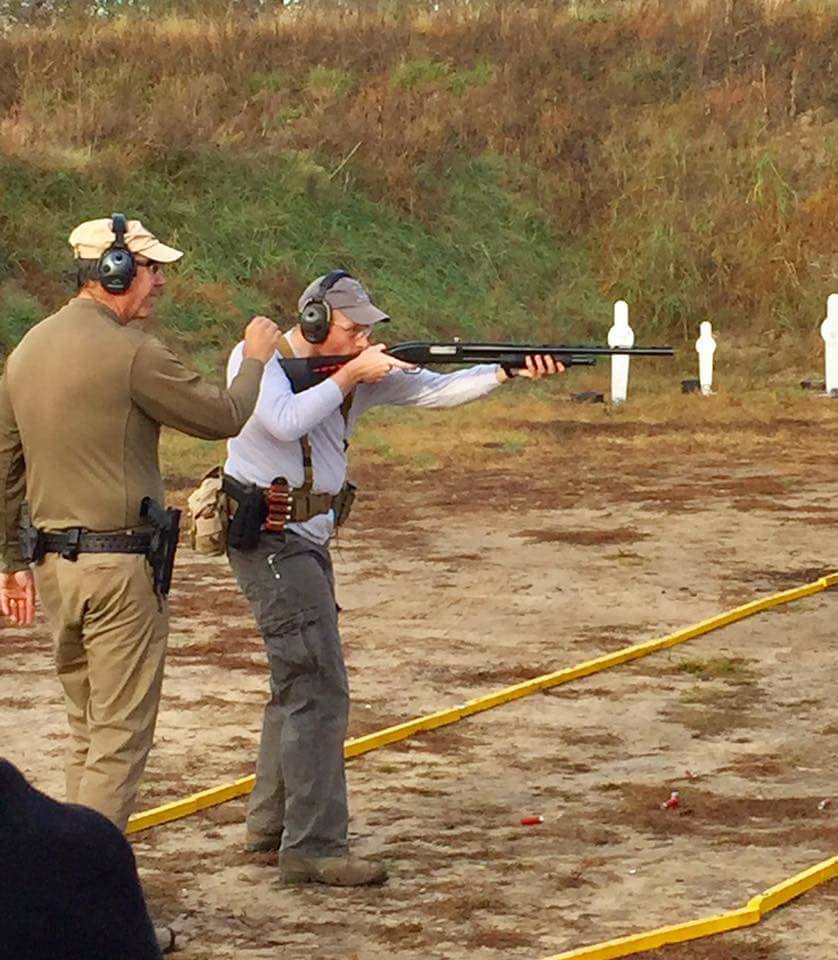
On the shooting side, competition gives us a break from basic square-range drills, and adds some stress from your squad of observers. Often times these stages are more complex than what we can build for our private practice, giving us a serious skills check and the measuring stick of other shooters. This doesn’t mean you need to be a USPSA Grand Master, or make it to a match every month. However, showing up from time to time can be a massive benefit to your skill, and it can connect you with other serious practitioners in your local area.
To be self-serving for a moment, good performance in competition only serves to make you look good. Having a solid classification in USPSA, SCSA, or IDPA can help you stand out from the crowd. While my classifications are dated and not particularly impressive, a somewhat recent podium placement in a regional GSSF match is one of my crowning shooting achievements, and is easily understood by the layman. Competition isn’t everything, but it certainly can help you grow and develop.
Participate in Discussion
Some of us have good ideas, and some of us have bad ideas. Sometimes we have serious misunderstandings that we take as fact based upon instruction previously received. By participating in discussion with peers, mentors, and others online, we grow our access to information by nearly an immeasurable degree. This provides us opportunities to learn and teach with a wide variety of personalities. That can then show us new perspectives we’ve never before considered, provide new explanations for topics we understand, and more.

Whether it’s a forum, or Facebook group, there are plenty of opportunities to converse online. I’ve connected with truly brilliant minds through these channels that I likely never would have interacted with if I limited myself to in-person interactions. I’ve also had previously held convictions and notions shaken and dismantled because of these conversations. You may be smart, but there’s almost certainly someone smarter than you about something somewhere on the internet. Seek them out, cherish their lessons. You may also be that person for someone else.
Study
You should be reading and watching high quality content on a variety of subjects. Not your standard Guntube entertainment, but serious informational books, articles, and videos. Much like how online discussion can open doors for us, so too can study. Look to the old masters to see how things used to be done, why they changed, or maybe how things have stayed the same. You’d be surprised to see Bill Jordan advocating for efficiencies in 1965 that modern instructors tout as revolutionary in the 2010’s and today. Or Fairbairn talking about close quarters gun fighting in the 1930’s that people are still developing.
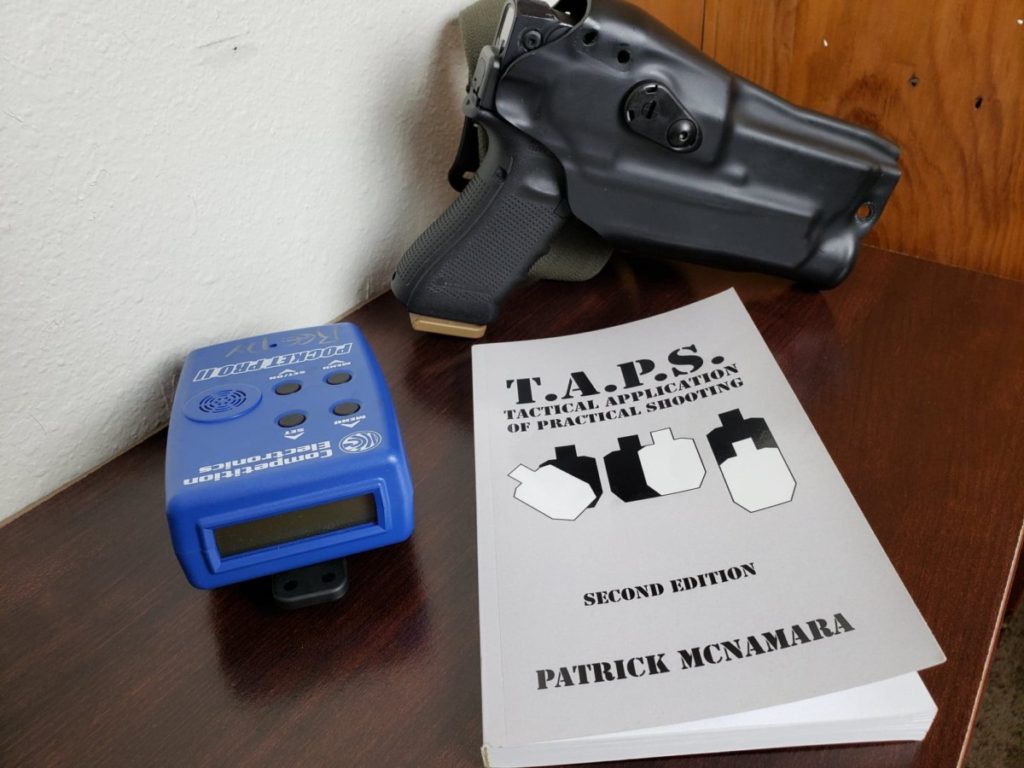
It’s not all ancient texts of course. Folks like Greg Ellifritz, Tom Givens, and Karl Rehn are putting out fantastic articles every month. Chris Baker, John Murphy, and Wilson Combat have highly informative videos that are free and unrestricted as well. While brain-rot is king for the internet algorithm, we have access to the virtual Library of Alexandria at our finger tips, and failing to leverage that resource does nothing to benefit us. Take some time, stop scrolling, and do some focused study.
Continuously Train
A sure sign of a bad instructor is someone who fails to continuously train. Classes are expensive, time is limited, and options are nearly endless. You don’t need to rack up hundreds of hours in classes each year. That said, try to be a student every now and then. Train with a variety of instructors to diversify your knowledge and approach. You might not know that your mentor is a bad example if they’re the only example you’ve ever seen. I’ve witnessed this personally. Pick up new tricks of the trade that may benefit you and your students. Get a check of skills and knowledge that may not come from practice or competition. You’ll also get a chance to see old friends, which is always a joy.
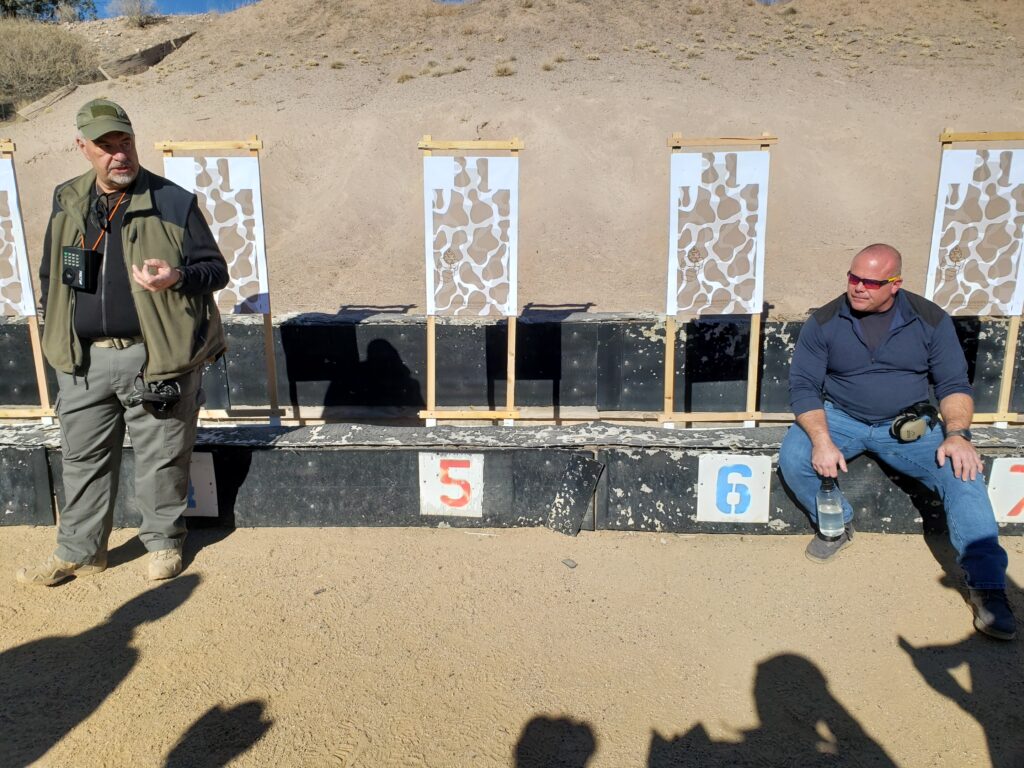
Seek improvement from outside of the firearms world. You can improve speaking, understanding, teaching, and more by leaving the firing line. Toastmasters is a popular suggestion to help you work on public speaking. Much of my teaching experience comes from the military, teaching Airmen our core duties, which provided me with a diverse pool of students, and hundreds of hours of public speaking. Martial arts and sports can help you better control your body and find new ways to help students who may be less physically capable than others. Get out of your comfort zone, and make yourself better.
Closing Thoughts on How to Become a Firearms Instructor | Getting Started
It can be intimidating to start the process of becoming a firearms instructor. Sometimes those of us who already teach can feel stuck or stagnant in our ways and position within the industry. Take a look at everything I’ve written here, and see where you could stand to make improvements. Also consider if this route is right for you. Not everyone is cut out to teach others, even if they have the desire, and that’s okay too.
As life gets busier, training gets tougher, and realigning priorities may change what you can do, versus what you want to do. I know that I have been slacking on the competitive side of things for the past few years, and I’m looking at changing that in the coming year.
Over the next few weeks we’ll take a look at more aspects of firearms instruction. Stay tuned!
Support My Work
If you made it this far, thanks for reading! Writing isn’t my full-time profession, and nearly everything I do comes out of my own pocket. Between ammunition, tuition, range fees and more, expenses add up fast. If you like what I have to offer, consider making a donation to my Patreon.
Every bit helps bring more work like this to you, and contributes to shortened timelines or more in-depth work on my part. You’ll also have more direct access to me, offering suggestions for future projects, looking behind the scenes, and getting early access to some content. You can find my Patreon >>HERE<<





2 Trackbacks / Pingbacks